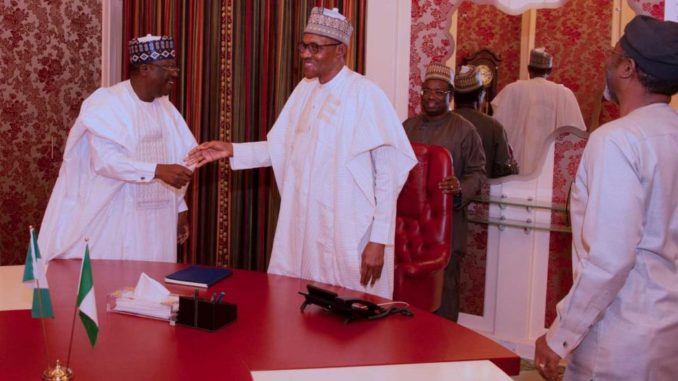
Humanity has reconciled with the fact that no product of man is perfect. It could be good or very good. It could be better in comparison with the outputs of others. It may also enjoy a superlative edge over similar exertions. But it can never be perfect. The simple point is that we can always improve on the outcomes of our exertions, even if they are good or the best, in relation to a given time. The core of innovation feeds on this principle. The world is a dynamic space. And the innovations we record – either sustaining or disruptive – are the world’s response to its existential dynamic. The essence of this introduction is to set the tone for the conversation on the current most topical issue in our political governance space, that is, the contentions around the Electoral Act Amendment Bill and the controversies and the drama that have trailed the decision of the President, Major General Muhammadu Buhari (retd.), to withhold assent.
The other day, the Special Adviser to the President on Media and Publicity, Femi Adesina, was asked if the president would sign the Electoral Amendment Bill. His response was to the effect that the president would do what is best for the country in relation to the electoral bill which, at the time, was still before him for review, assent or decline. When he was probed further on what that meant in concrete terms, his response was far from assuring. It was evident that he, too, didn’t know what his principal would do.
For a president who has spoken so much about leaving a legacy of credible elections, the natural expectation would have been for him to own the electoral reforms process and follow through with it. The decision to withhold assent betrays the president’s intentions and preference for the status quo. It is doubtful that anything would change. It is quite ironic that the business of government has continued in spite of some of the challenges that the president noted. Ensuring credible elections cannot be a product of an executive order, which, perhaps, was what the president was contemplating. The reality of electoral reforms can only be the result of a thorough process of wide consultations and initiative of innovation, with the force of legislation behind it.
No piece of legislation is perfect. And this Electoral Act Amendment Bill is no exception. There will always be room for modifications in tune with new opportunities as they present themselves. The bill as a whole is an effort at moving the mark. Unfortunately, the president is not so inclined. The reality is that he didn’t want to have anything to do with it. The real issue is with the direct primaries, which the president submits, “are not free from manipulations and do not particularly guarantee the emergence of the will of the people especially in circumstances like ours where it is near impossible to sustain a workable implementation framework or structure thereof.”
The lawmakers think differently. No one is under the illusion that the decision is completely in the best interest of Nigerians. What is at play is a desperate political survival tactic that emphasises the emergence of political actors rather than more engaged participation by the Nigerian electorate. And then, the manipulation the president speaks about is only so because it serves certain interests, not because it is impossible to have a water-tight implementation framework. It is deliberate. And the situation it evinces is what we have observed in recent elections where candidates record, during the polls, a disappointing fraction of the party primary numbers. The math never adds up.
Read Also
How to be was not to be
Why Buhari will not sign proposed electoral law – Malami
Don’t dissipate energy on Buhari’s refusal to sign electoral law – Opadokun
Where do we go from here? No one knows for sure, but the country would now have to wait till January for the lawmakers to determine their next line of action. They couldn’t go through the earlier stance to override the president’s decision. Of course, quite a number of people, including myself, have continued to keenly follow the sequence of events. The thought of a possible override of the president’s decision was quite interesting. It was completely out of character for the Ahmad Lawan-led Senate to contemplate such a direction. The prospect of the Senate going the whole hog on the matter was exciting enough by the very fact that it was unprecedented. Nigerians naturally looked forward to something unusual happening. But the whole drama was for nothing. An off-putting anti-climax. As many had expected, the Senate baulked at the idea of overriding the president in order not to ‘embarrass’ him. What’s this thing about not wanting to ‘embarrass’ the president? And on whose side are the legislators: theirs, the president or the constituents they represent? In any case, the masses of Nigerians know that their interests are rarely ever the interests championed by the political class.
The next, on this development, would be heard only when the lawmakers resume plenary on January 17, 2021. In the meantime, they have been asked to confer with their constituents. The real ‘instruction’ is for them to consult with their constituents. Nothing significant is expected to happen. The excuse is just something for Nigerians to ‘hold body’. But the truth must be said. The excuse is lazy. And the dithering makes a joke of the whole process. Didn’t the lawmakers sound out their constituents before preparing and achieving concurrence on the bill in the first place? If they did, what, then, is this new ‘consultation’ supposed to achieve? Politicians can go on and on with the theatrics, but the majority of Nigerians are uninterested. Let’s just get this done and move on to the next agenda. There are other pressing issues to get busy with. But we keep wasting the time we don’t have.
Samuel Akinnuga writes via samuelakinnuga@yahoo.com
END

Be the first to comment